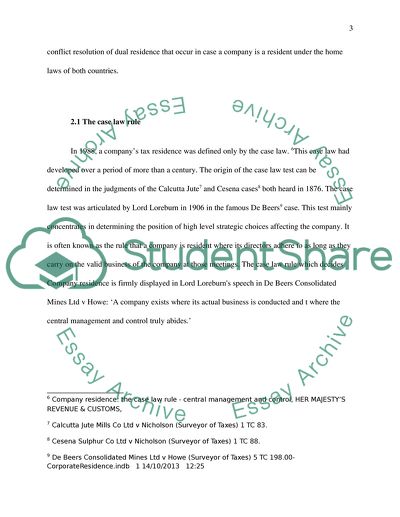Cite this document
(“Corporate residence in the modern world The rule for determining the Essay - 1”, n.d.)
Corporate residence in the modern world The rule for determining the Essay - 1. Retrieved from https://studentshare.org/law/1633661-corporate-residence-in-the-modern-world-the-rule-for-determining-the-place-of-central-management-and-control-is-authoritatively-expressed-in-lord-loreburns-speech-in-de-beers-consolidated-mines-ltd-v-howe-1906-ac-455-a-company-resides
Corporate residence in the modern world The rule for determining the Essay - 1. Retrieved from https://studentshare.org/law/1633661-corporate-residence-in-the-modern-world-the-rule-for-determining-the-place-of-central-management-and-control-is-authoritatively-expressed-in-lord-loreburns-speech-in-de-beers-consolidated-mines-ltd-v-howe-1906-ac-455-a-company-resides
(Corporate Residence in the Modern World The Rule for Determining the Essay - 1)
Corporate Residence in the Modern World The Rule for Determining the Essay - 1. https://studentshare.org/law/1633661-corporate-residence-in-the-modern-world-the-rule-for-determining-the-place-of-central-management-and-control-is-authoritatively-expressed-in-lord-loreburns-speech-in-de-beers-consolidated-mines-ltd-v-howe-1906-ac-455-a-company-resides.
Corporate Residence in the Modern World The Rule for Determining the Essay - 1. https://studentshare.org/law/1633661-corporate-residence-in-the-modern-world-the-rule-for-determining-the-place-of-central-management-and-control-is-authoritatively-expressed-in-lord-loreburns-speech-in-de-beers-consolidated-mines-ltd-v-howe-1906-ac-455-a-company-resides.
“Corporate Residence in the Modern World The Rule for Determining the Essay - 1”, n.d. https://studentshare.org/law/1633661-corporate-residence-in-the-modern-world-the-rule-for-determining-the-place-of-central-management-and-control-is-authoritatively-expressed-in-lord-loreburns-speech-in-de-beers-consolidated-mines-ltd-v-howe-1906-ac-455-a-company-resides.


